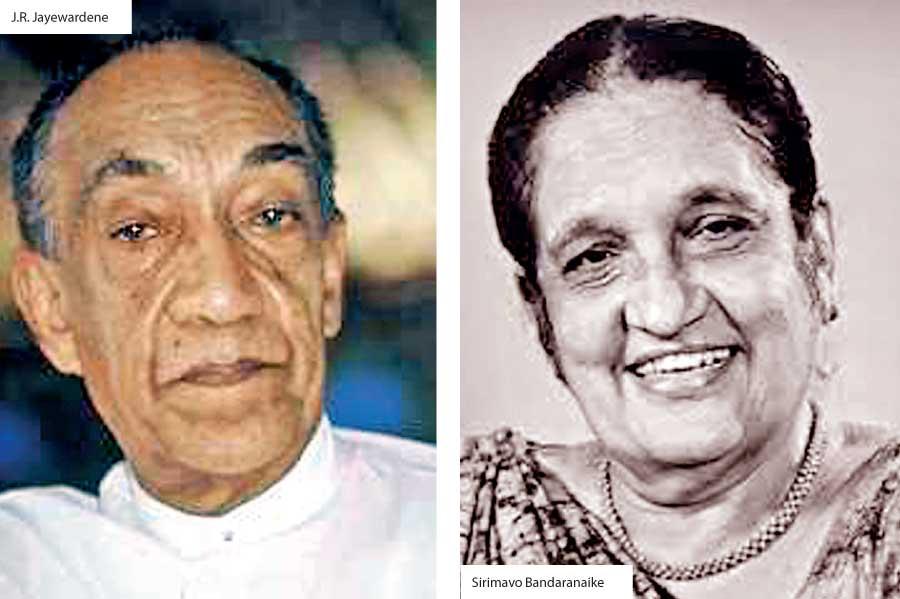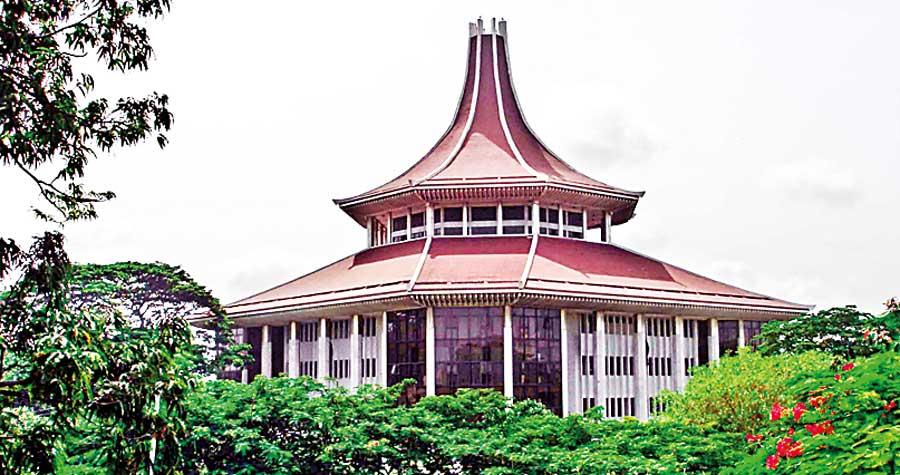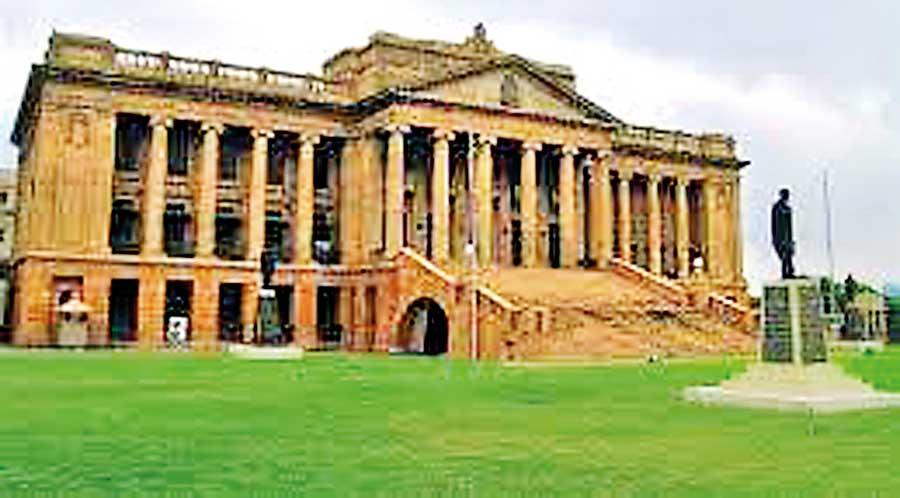08 Feb 2021 - {{hitsCtrl.values.hits}}

The President has appointed a Special 3-member Presidential Commission to implement recommendations of PCoI on political victimization, under provisions of UNP’s Draconian piece of legislation called Special Presidential CoI Act No. 07 of 1978. The above, most malicious piece of legislation that targeted Ms. Bandaranaike was passed in the parliament after receiving a 5/6 majority in 1977. The President, it is believed, has conferred the Commission with powers to recommend civil disability on those found ‘guilty’ of misuse or abuse power during previous yahapalana rule. The report of original Commission had recommended the release of many whose cases were being heard before Courts, and presumed to be ‘victims’ of acts of misuse of powers by them.
passed in the parliament after receiving a 5/6 majority in 1977. The President, it is believed, has conferred the Commission with powers to recommend civil disability on those found ‘guilty’ of misuse or abuse power during previous yahapalana rule. The report of original Commission had recommended the release of many whose cases were being heard before Courts, and presumed to be ‘victims’ of acts of misuse of powers by them.
On 29th March 1978, President JR appointed a Commission consisting of two Supreme Court Judges and a member of the lower Judiciary to inquire and report on several matters that covered Ms. Sirimavo B’s Coalition of 1970-77.
The three-member committee was empowered by the Gazette issued on January 19, 2021 to look into the recommendations of the pervious Commission headed by former Supreme Court Judge Upali Abeyratne, which found that the Commission to Investigate Bribery or Corruption, FCID, and the Special Investigations Unit of the Police had been established contravening the requirements of the Code of Criminal Procedure and was in violation of the Constitution. The 2nd Commission’s tasks included investigating on the extent to which those named were answerable for violation of the law, abuse of power, and advised whether their civil rights should be withdrawn as per the provisions of the Constitution [Article 81] and SpPCoI Act No. 7 of 1978. Appeared to be politically motivated?
The original PCoI had found that a number of Opposition politicians and a few outsiders, [names have not been announced but reportedly include a few Opposition politicians and some public officials] who held positions under previous government, had faced charges of abuse of power and similar offences.
Can the Executive and Legislature, two of the three pillars of democracy, pass judgment or impose punishment, subjugating the third pillar, the judiciary? The first two can only create truth- seeking mechanisms within a democratic framework.

Politicians in the past, especially during Jayewardene regime, endeavored not only to influence but disgraced the Judiciary by introducing Constitutional amendments to reverse or squash Appeal Courts determinations. They even tinkered with the supreme law of the nation to suit the personal interests of politicians rather than public oriented or in national interest. The 1978 Law targeted Sirimavo Bandaranaike and members of her close circle in her 1970-77 rule. This followed the SpP C.of I. [Sp Provisions ]Act no 4 of ’78 passed on November 22, to quash the judgment of Court of Appeal in writ application no. 1 of 1978, which delivered its ruling in favour of Ms. Bandaranaike on 9th November. The ruling stated that the Commission had no jurisdiction to inquire into actions committed before the enactment of the law; and hence it had no legal effect.
When JR’s draft Bill for the 1978 Constitution was presented, Ms. Bandaranaike, speaking in Parliament recollected her presumption when JR sought to bestow on him executive powers under the 2nd Amendment to 1972 Constitution…,
“I state, on behalf of the Sri Lanka Freedom Party, that on the day the autocracy of JR Jayewardene is established through the Constitution of Sri Lanka, will also be the day that we launch our struggle outside this House with the people, and we will endeavor to light the lamps which you have put out. There will be a series of forces against us including those of neo-colonialism which have been given a foothold on our soil. Forces of State power will be used, and we will be arrested under your new draconian laws, and locked up in jails. But we will not be discouraged by such threats, acts, or fears. Our party, which has been consecrated by the blood of SWRD Bandaranaike, will certainly not be frightened.”—Hansard: 3rd August 1978
However, they successfully moved a proposal to strip Sirimavo of her civic rights which was passed in Parliament on 16th October 1980, which unceremoniously expelled her from Parliament. The act was seen by the international community as the beginning of declining of good parliamentary governance and desecration of hallowed precincts of Judiciary in Sri Lanka. Interference or undermining the position of Judiciary progressed unabated for 40 years since Felix Dias Bandaranaike became Minister of Justice in Sirimavo’s ‘70-’77 Cabinet. He attempted to introduce politically committed judges to highest courts, especially during its final three years in office, thereby first seeds were sewn. President J R Jayewardene took over reigns from Sirimavo in 1977, and continued from where Felix stopped and struck the foundation of the rule of law and the independence of the Judiciary; ironically, both were sons of honorable Supreme Court Judges.

JR knew by removing Sirimavo from political activity, that he can create divisions within the SLFP. A. Amirthalingam, Leader of Opposition, speaking on the two bills said, “…it is deplorable, the amendment has retrospective effect and, worse still, annulled a decision of the Appeal Court; in doing so government was setting Parliament up as a court above Supreme Court.” – Hansard; Nov 10. 1978
The Special Presidential Commissions of Inquiry in terms of Section 9 of the Act recommended imposition of civic disability and consequent expulsion from the Parliament on Sirimavo; and deprivation of civic rights of Felix Dias and few others. At the Cabinet meeting, S Thondamaan, Gamini Dissanayake, Ananda Tissa de Alwis spoke against it, though. Sir John Kotalawala, the 85 year-old ex PM, made personal representations to JR, who feared facing her at a future election.
Participating in the debate on expulsion, Leader of Opposition Amirthalingam stated that, “…the only forum before which political offences of this type can be agitated is the forum of the hustings. The people have given the verdict by returning Mrs. Bandaranaike to this House. …. You have no right now to sit in judgment on what the voters of Attanagalla have done. Retrospectively and retro-actively you are creating offences and are meting out punishment which is not in keeping with the fundamental rights you have guaranteed and which are a violation of the Universal Charter of Human Rights”.
Sirimavo made a short fair-well speech and left her seat in Parliament amidst indecent remarks, and cat-calls from government benches: [other six SLFP MPs boycotted the sittings]—she was to leave the chamber unaccompanied, when Amirthalingam and Sivasittamparam, the two gentlemen parliamentarians rose from their seats to escort her out.
‘Unjust, unfair, and revengeful’ actions can boomerang on rulers. “For, when the One Great Scorer comes to write against your name, He writes not that you won or lost - but how you played the game.”
Will they ever learn?

29 Nov 2024 9 hours ago
29 Nov 2024 29 Nov 2024
29 Nov 2024 29 Nov 2024
29 Nov 2024 29 Nov 2024
29 Nov 2024 29 Nov 2024